Consumer Behaviour and Digital Trends in Hospitality: A Report
VerifiedAdded on 2023/01/19
|13
|762
|43
Report
AI Summary
This report delves into consumer behavior within the hospitality industry, examining the multifaceted factors that influence customer decisions. It explores cultural, social, and personal factors, highlighting their impact on consumer attitudes and actions. Furthermore, the report investigates how digital technology is reshaping consumer trends, emphasizing the importance of understanding customer experiences, managing content, and addressing transparency concerns. It offers insights into how hospitality businesses, like the Thomas Cook Group, can leverage digital tools to solve customer queries, penetrate consumer mindsets, and provide better services. The report concludes by summarizing the key influences on consumer behavior and the transformative effects of digital technology in the hospitality sector, providing valuable information for businesses aiming to adapt to evolving consumer expectations.
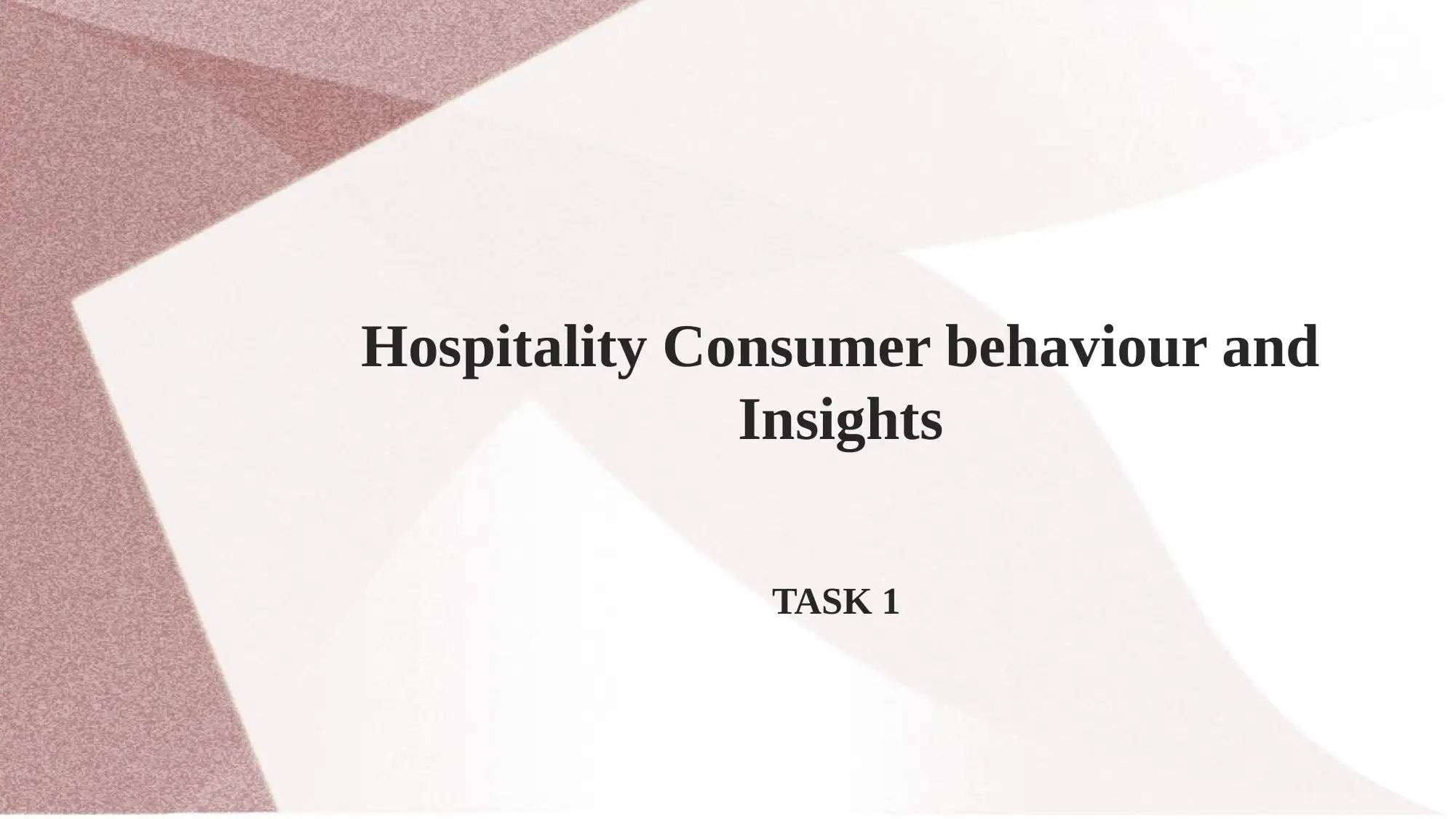
Hospitality Consumer behaviour and
Insights
TASK 1
Insights
TASK 1
Paraphrase This Document
Need a fresh take? Get an instant paraphrase of this document with our AI Paraphraser
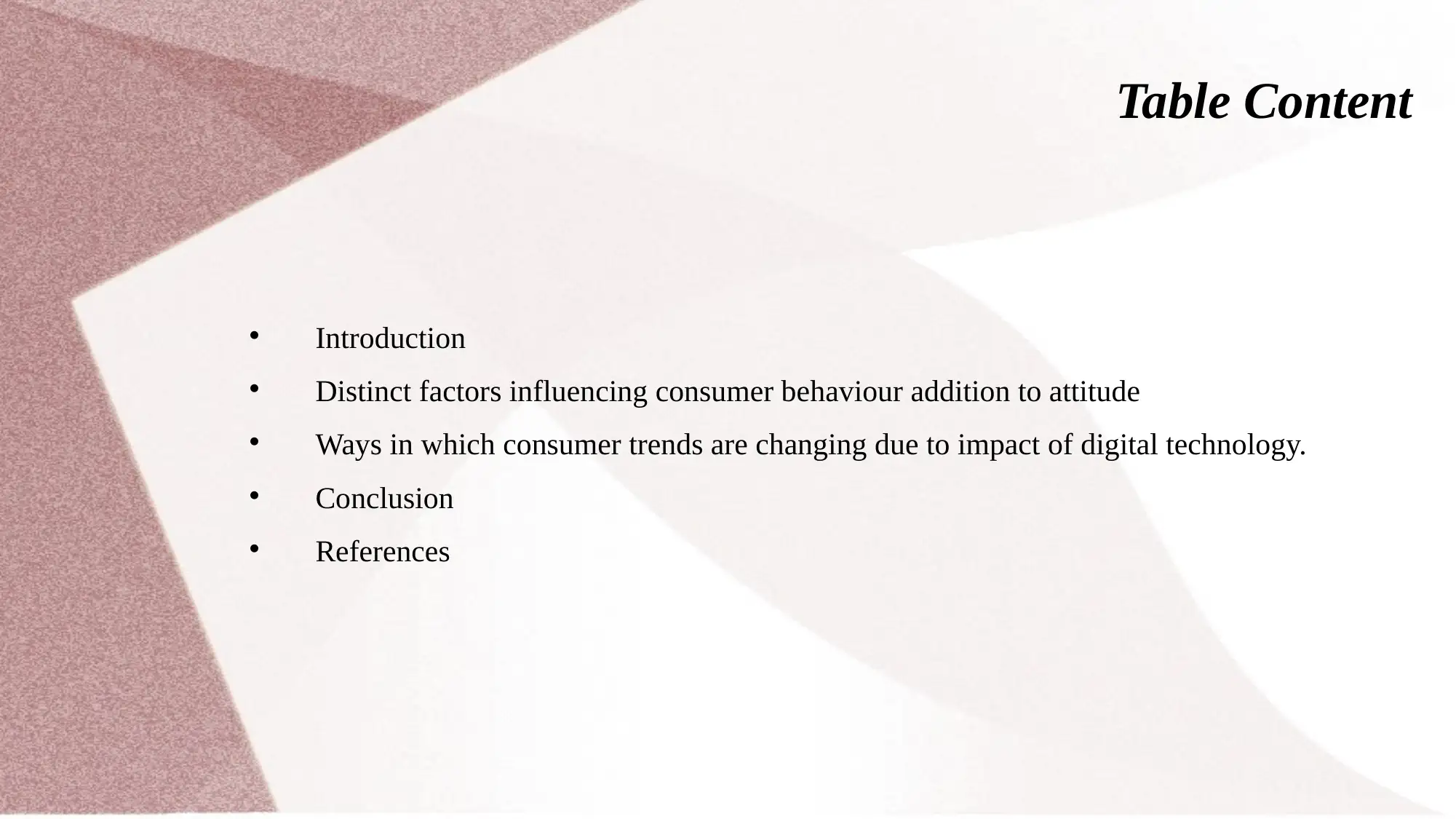
Table Content
Introduction
Distinct factors influencing consumer behaviour addition to attitude
Ways in which consumer trends are changing due to impact of digital technology.
Conclusion
References
Introduction
Distinct factors influencing consumer behaviour addition to attitude
Ways in which consumer trends are changing due to impact of digital technology.
Conclusion
References
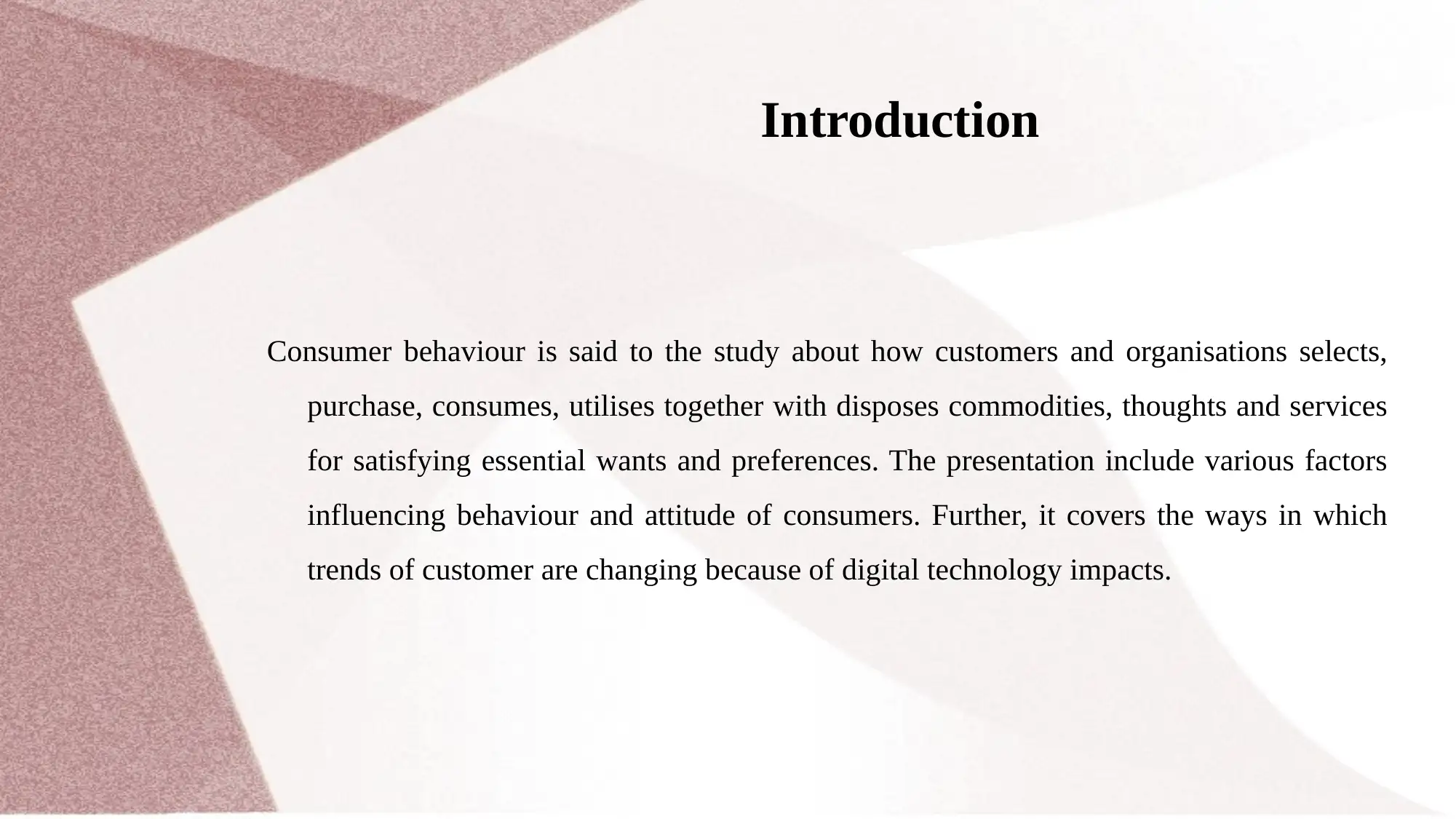
Introduction
Consumer behaviour is said to the study about how customers and organisations selects,
purchase, consumes, utilises together with disposes commodities, thoughts and services
for satisfying essential wants and preferences. The presentation include various factors
influencing behaviour and attitude of consumers. Further, it covers the ways in which
trends of customer are changing because of digital technology impacts.
Consumer behaviour is said to the study about how customers and organisations selects,
purchase, consumes, utilises together with disposes commodities, thoughts and services
for satisfying essential wants and preferences. The presentation include various factors
influencing behaviour and attitude of consumers. Further, it covers the ways in which
trends of customer are changing because of digital technology impacts.
⊘ This is a preview!⊘
Do you want full access?
Subscribe today to unlock all pages.

Trusted by 1+ million students worldwide
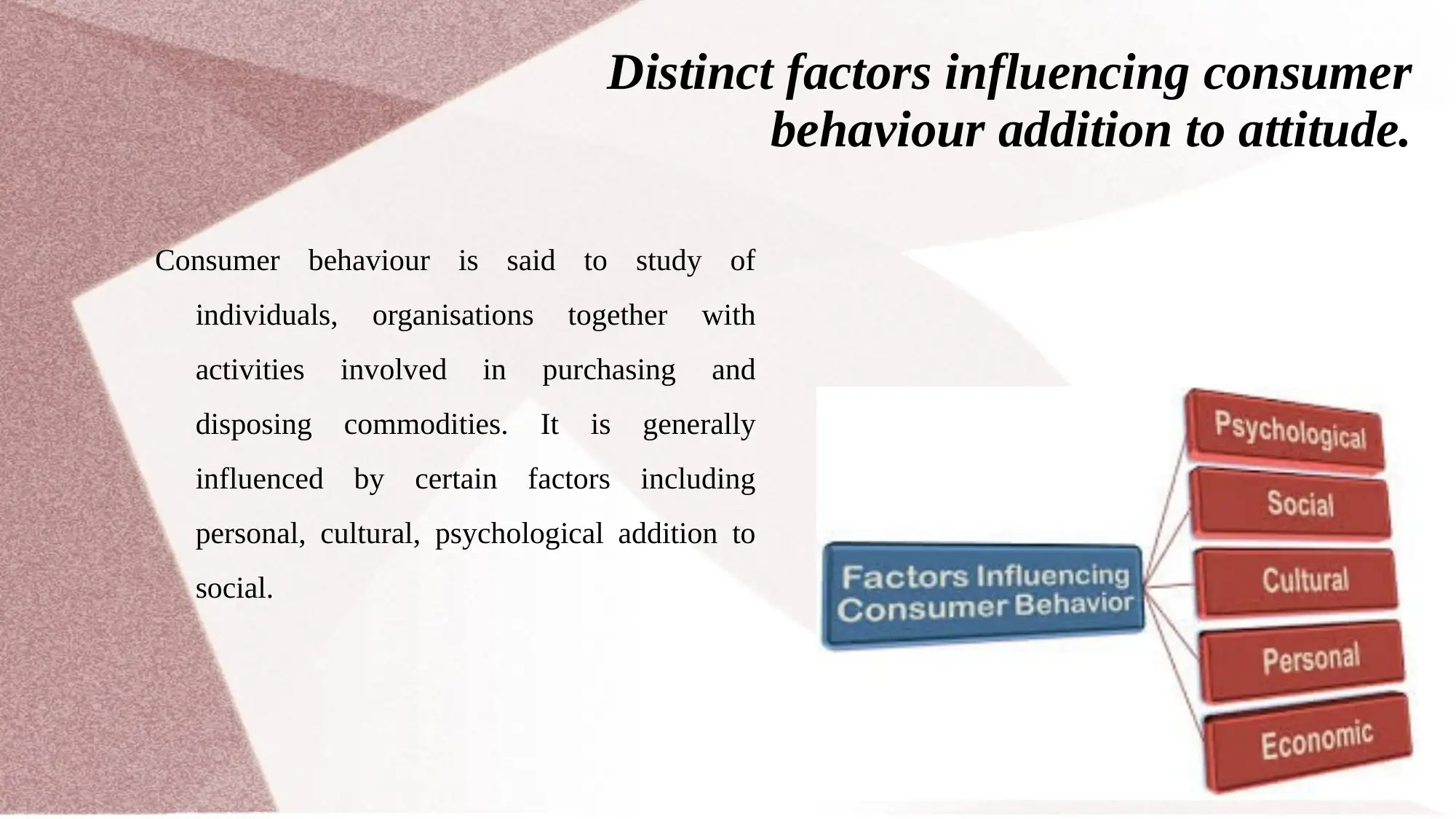
Distinct factors influencing consumer
behaviour addition to attitude.
Consumer behaviour is said to study of
individuals, organisations together with
activities involved in purchasing and
disposing commodities. It is generally
influenced by certain factors including
personal, cultural, psychological addition to
social.
behaviour addition to attitude.
Consumer behaviour is said to study of
individuals, organisations together with
activities involved in purchasing and
disposing commodities. It is generally
influenced by certain factors including
personal, cultural, psychological addition to
social.
Paraphrase This Document
Need a fresh take? Get an instant paraphrase of this document with our AI Paraphraser
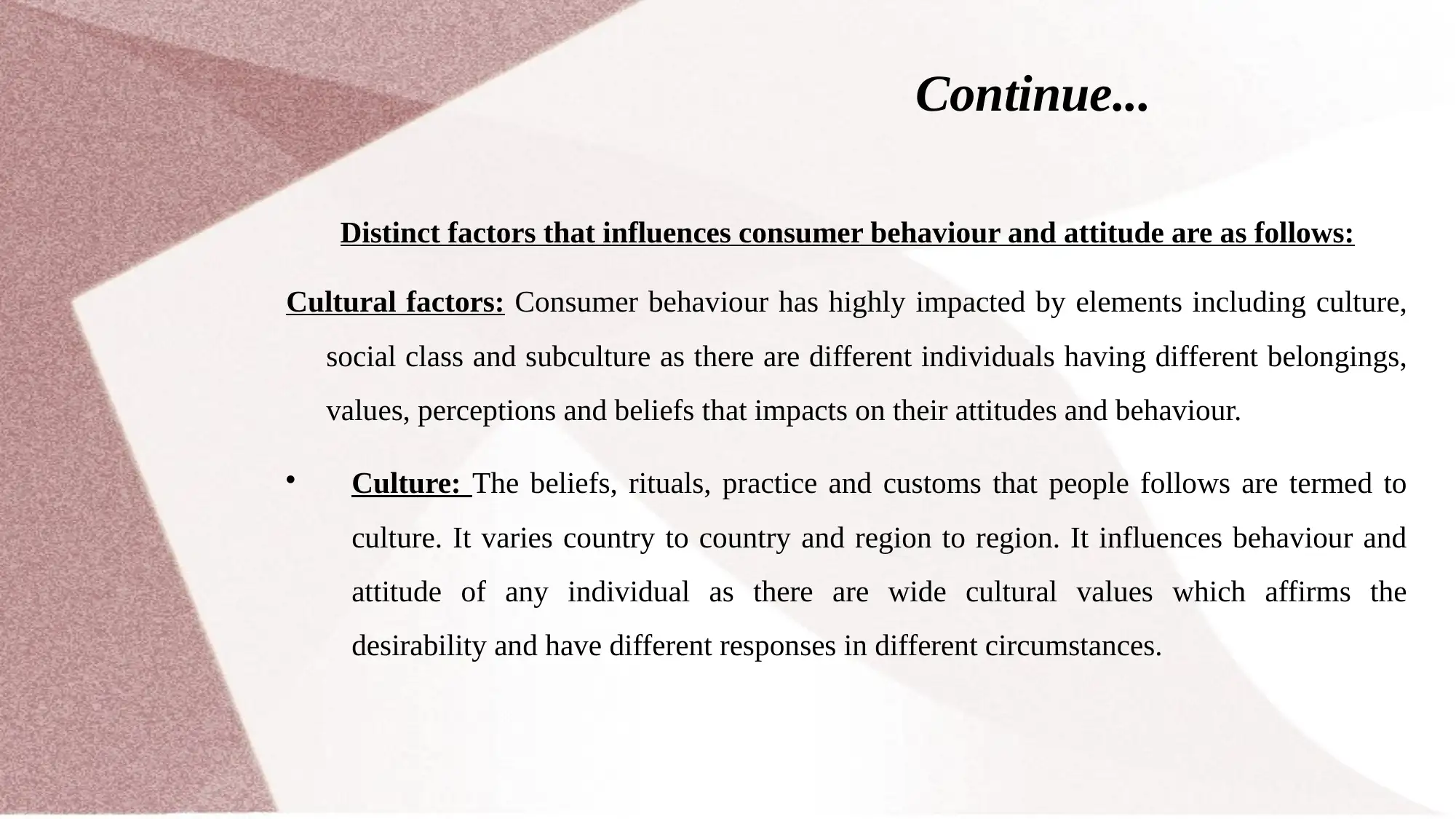
Continue...
Distinct factors that influences consumer behaviour and attitude are as follows:
Cultural factors: Consumer behaviour has highly impacted by elements including culture,
social class and subculture as there are different individuals having different belongings,
values, perceptions and beliefs that impacts on their attitudes and behaviour.
Culture: The beliefs, rituals, practice and customs that people follows are termed to
culture. It varies country to country and region to region. It influences behaviour and
attitude of any individual as there are wide cultural values which affirms the
desirability and have different responses in different circumstances.
Distinct factors that influences consumer behaviour and attitude are as follows:
Cultural factors: Consumer behaviour has highly impacted by elements including culture,
social class and subculture as there are different individuals having different belongings,
values, perceptions and beliefs that impacts on their attitudes and behaviour.
Culture: The beliefs, rituals, practice and customs that people follows are termed to
culture. It varies country to country and region to region. It influences behaviour and
attitude of any individual as there are wide cultural values which affirms the
desirability and have different responses in different circumstances.
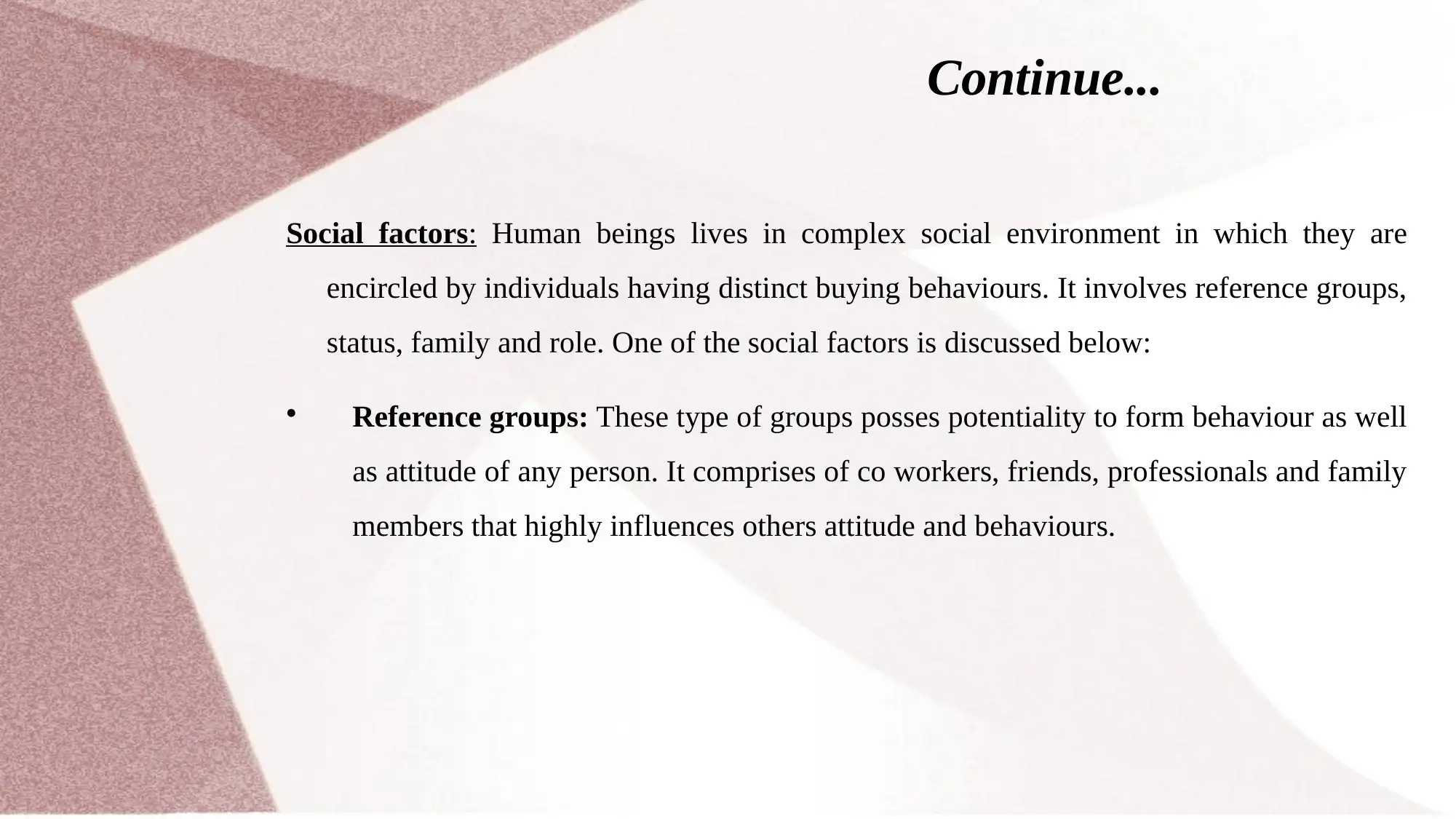
Continue...
Social factors: Human beings lives in complex social environment in which they are
encircled by individuals having distinct buying behaviours. It involves reference groups,
status, family and role. One of the social factors is discussed below:
Reference groups: These type of groups posses potentiality to form behaviour as well
as attitude of any person. It comprises of co workers, friends, professionals and family
members that highly influences others attitude and behaviours.
Social factors: Human beings lives in complex social environment in which they are
encircled by individuals having distinct buying behaviours. It involves reference groups,
status, family and role. One of the social factors is discussed below:
Reference groups: These type of groups posses potentiality to form behaviour as well
as attitude of any person. It comprises of co workers, friends, professionals and family
members that highly influences others attitude and behaviours.
⊘ This is a preview!⊘
Do you want full access?
Subscribe today to unlock all pages.

Trusted by 1+ million students worldwide
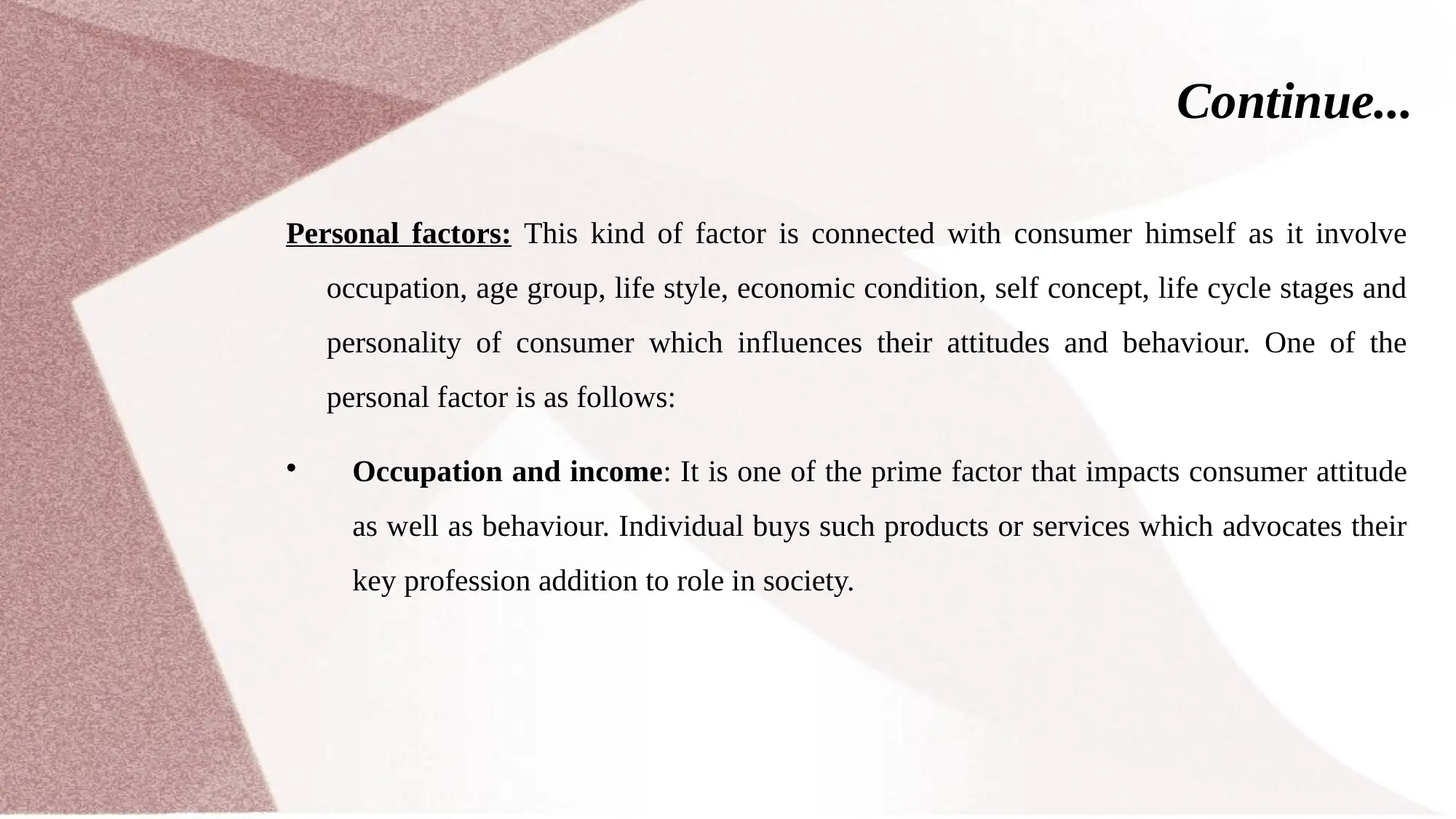
Continue...
Personal factors: This kind of factor is connected with consumer himself as it involve
occupation, age group, life style, economic condition, self concept, life cycle stages and
personality of consumer which influences their attitudes and behaviour. One of the
personal factor is as follows:
Occupation and income: It is one of the prime factor that impacts consumer attitude
as well as behaviour. Individual buys such products or services which advocates their
key profession addition to role in society.
Personal factors: This kind of factor is connected with consumer himself as it involve
occupation, age group, life style, economic condition, self concept, life cycle stages and
personality of consumer which influences their attitudes and behaviour. One of the
personal factor is as follows:
Occupation and income: It is one of the prime factor that impacts consumer attitude
as well as behaviour. Individual buys such products or services which advocates their
key profession addition to role in society.
Paraphrase This Document
Need a fresh take? Get an instant paraphrase of this document with our AI Paraphraser
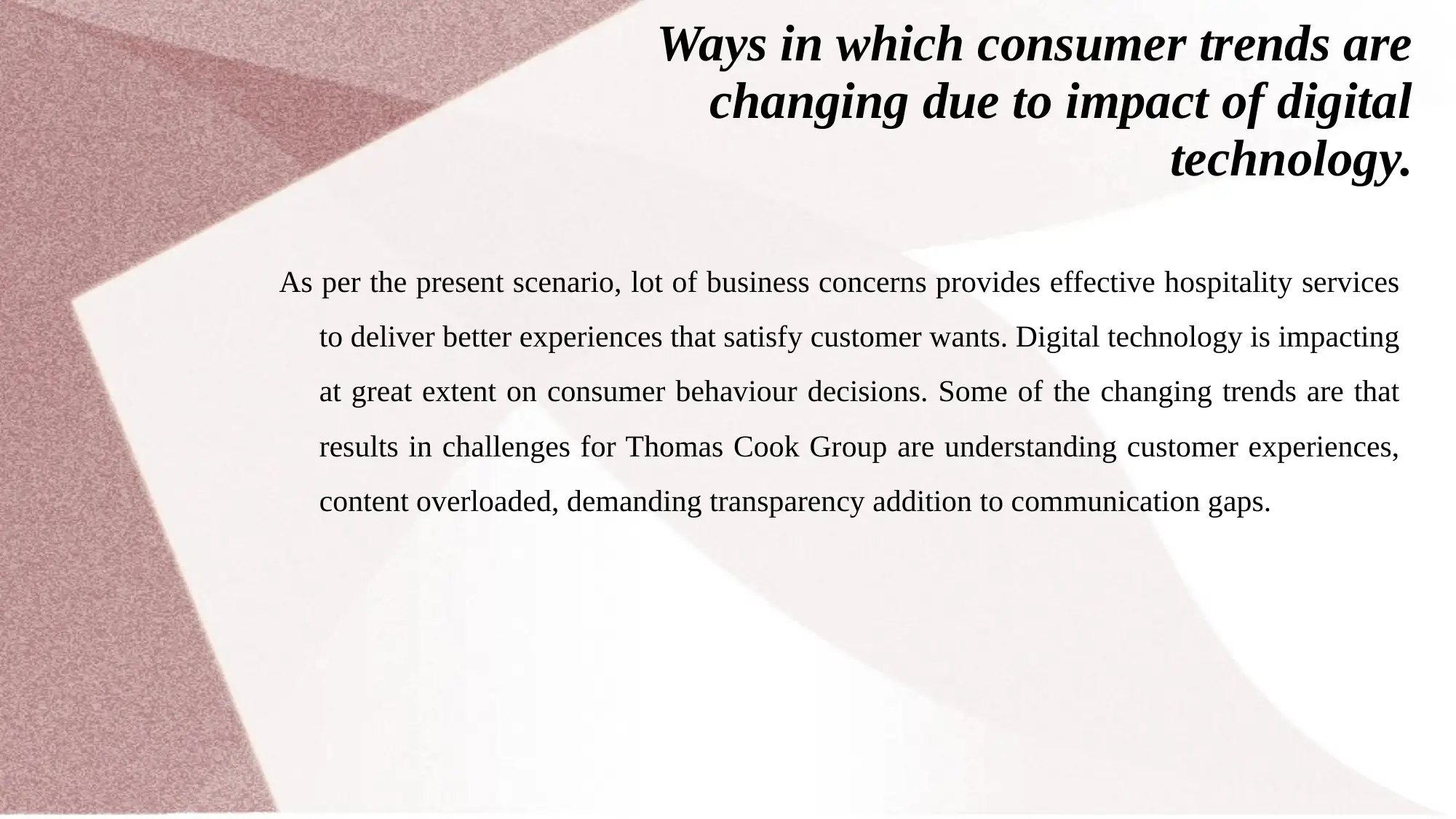
Ways in which consumer trends are
changing due to impact of digital
technology.
As per the present scenario, lot of business concerns provides effective hospitality services
to deliver better experiences that satisfy customer wants. Digital technology is impacting
at great extent on consumer behaviour decisions. Some of the changing trends are that
results in challenges for Thomas Cook Group are understanding customer experiences,
content overloaded, demanding transparency addition to communication gaps.
changing due to impact of digital
technology.
As per the present scenario, lot of business concerns provides effective hospitality services
to deliver better experiences that satisfy customer wants. Digital technology is impacting
at great extent on consumer behaviour decisions. Some of the changing trends are that
results in challenges for Thomas Cook Group are understanding customer experiences,
content overloaded, demanding transparency addition to communication gaps.
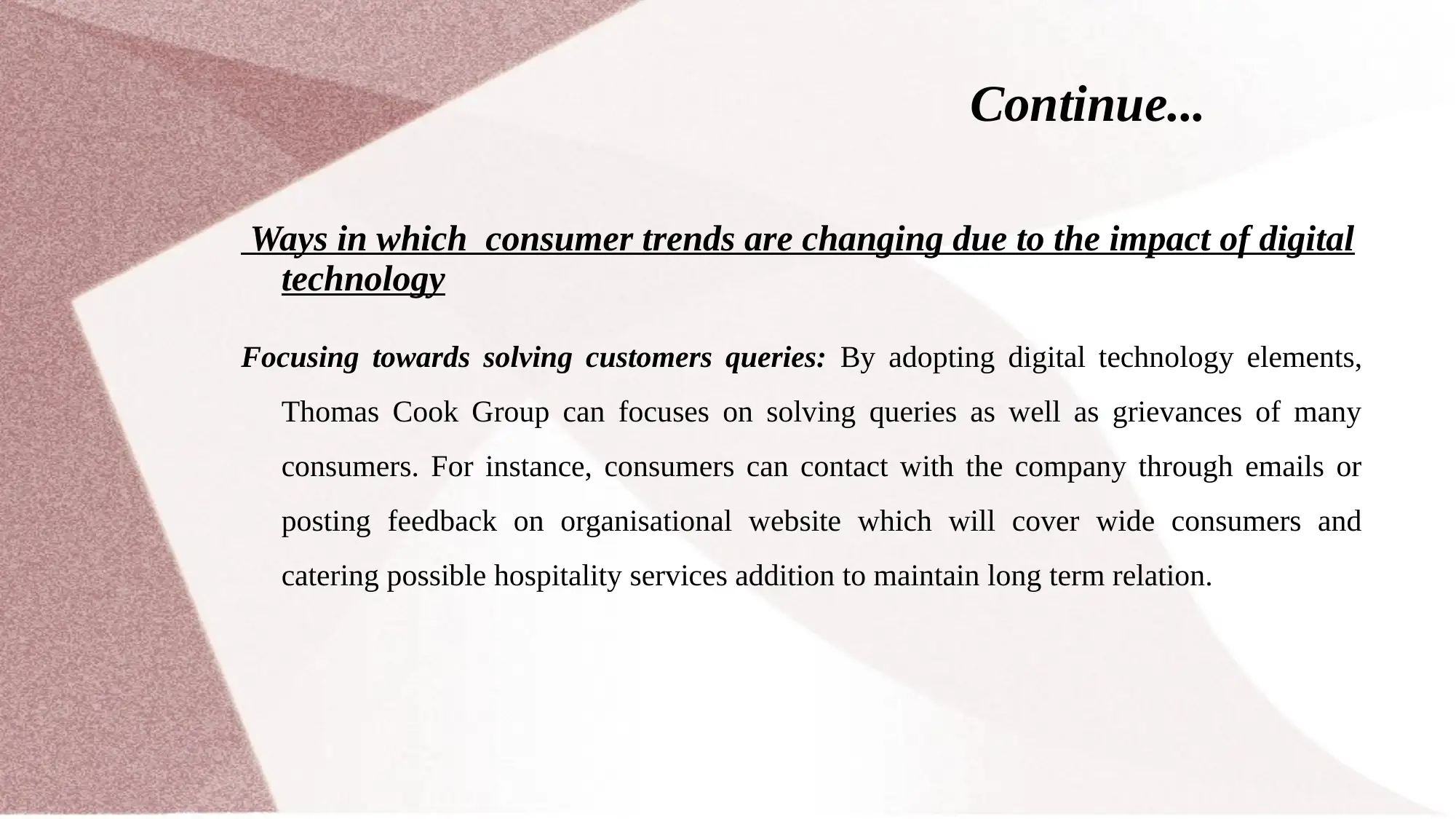
Continue...
Ways in which consumer trends are changing due to the impact of digital
technology
Focusing towards solving customers queries: By adopting digital technology elements,
Thomas Cook Group can focuses on solving queries as well as grievances of many
consumers. For instance, consumers can contact with the company through emails or
posting feedback on organisational website which will cover wide consumers and
catering possible hospitality services addition to maintain long term relation.
Ways in which consumer trends are changing due to the impact of digital
technology
Focusing towards solving customers queries: By adopting digital technology elements,
Thomas Cook Group can focuses on solving queries as well as grievances of many
consumers. For instance, consumers can contact with the company through emails or
posting feedback on organisational website which will cover wide consumers and
catering possible hospitality services addition to maintain long term relation.
⊘ This is a preview!⊘
Do you want full access?
Subscribe today to unlock all pages.

Trusted by 1+ million students worldwide
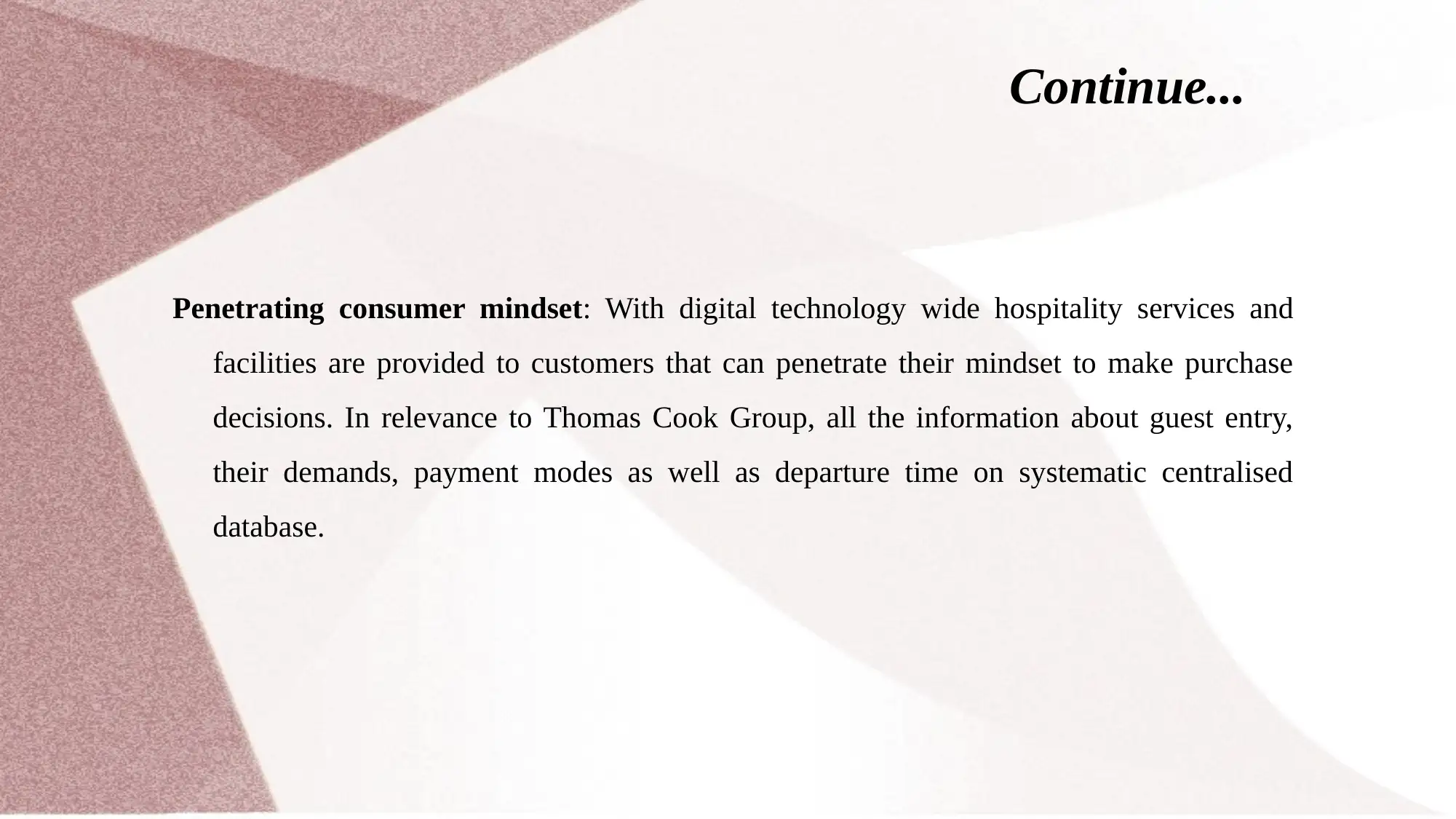
Continue...
Penetrating consumer mindset: With digital technology wide hospitality services and
facilities are provided to customers that can penetrate their mindset to make purchase
decisions. In relevance to Thomas Cook Group, all the information about guest entry,
their demands, payment modes as well as departure time on systematic centralised
database.
Penetrating consumer mindset: With digital technology wide hospitality services and
facilities are provided to customers that can penetrate their mindset to make purchase
decisions. In relevance to Thomas Cook Group, all the information about guest entry,
their demands, payment modes as well as departure time on systematic centralised
database.
Paraphrase This Document
Need a fresh take? Get an instant paraphrase of this document with our AI Paraphraser
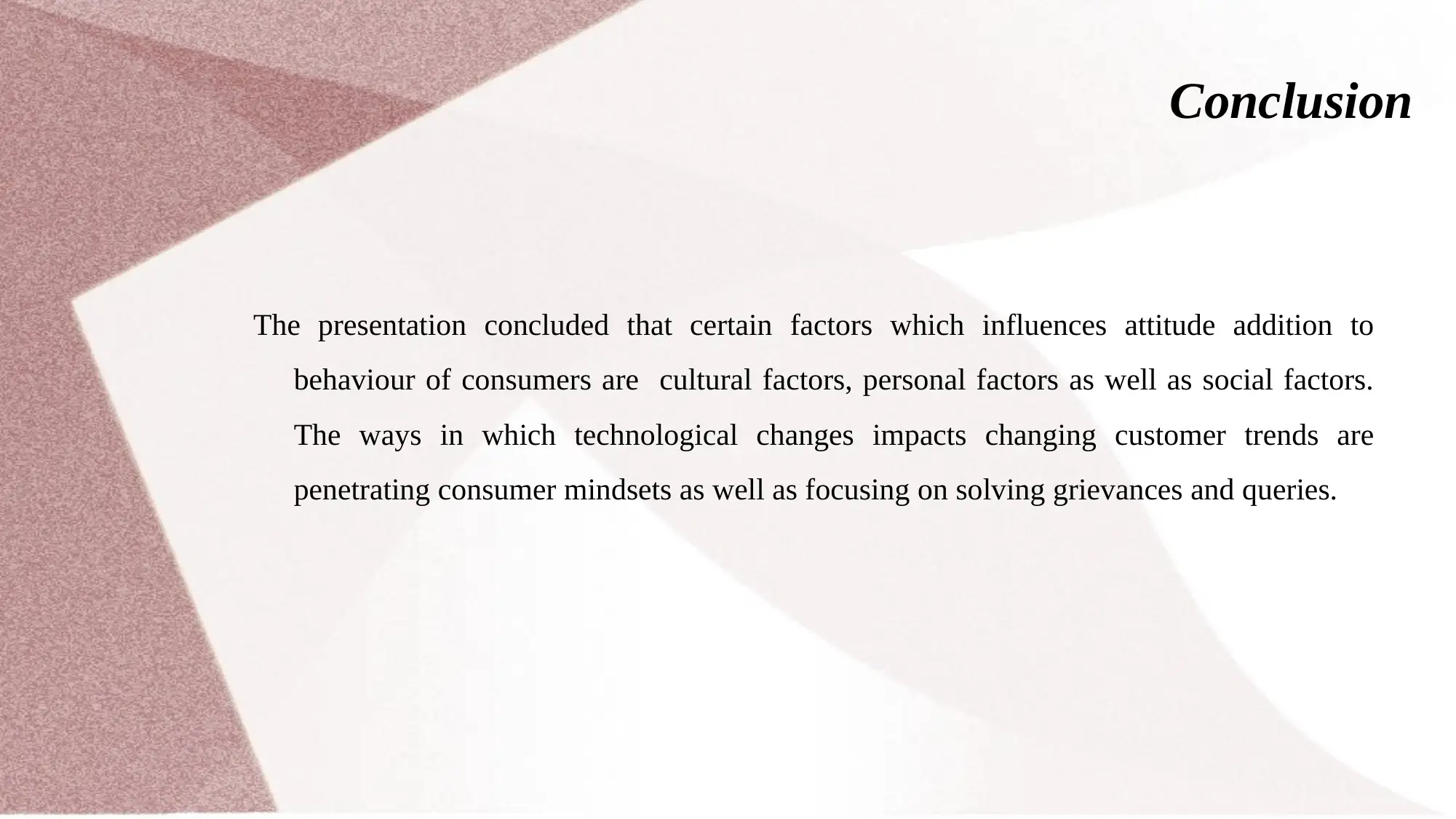
Conclusion
The presentation concluded that certain factors which influences attitude addition to
behaviour of consumers are cultural factors, personal factors as well as social factors.
The ways in which technological changes impacts changing customer trends are
penetrating consumer mindsets as well as focusing on solving grievances and queries.
The presentation concluded that certain factors which influences attitude addition to
behaviour of consumers are cultural factors, personal factors as well as social factors.
The ways in which technological changes impacts changing customer trends are
penetrating consumer mindsets as well as focusing on solving grievances and queries.
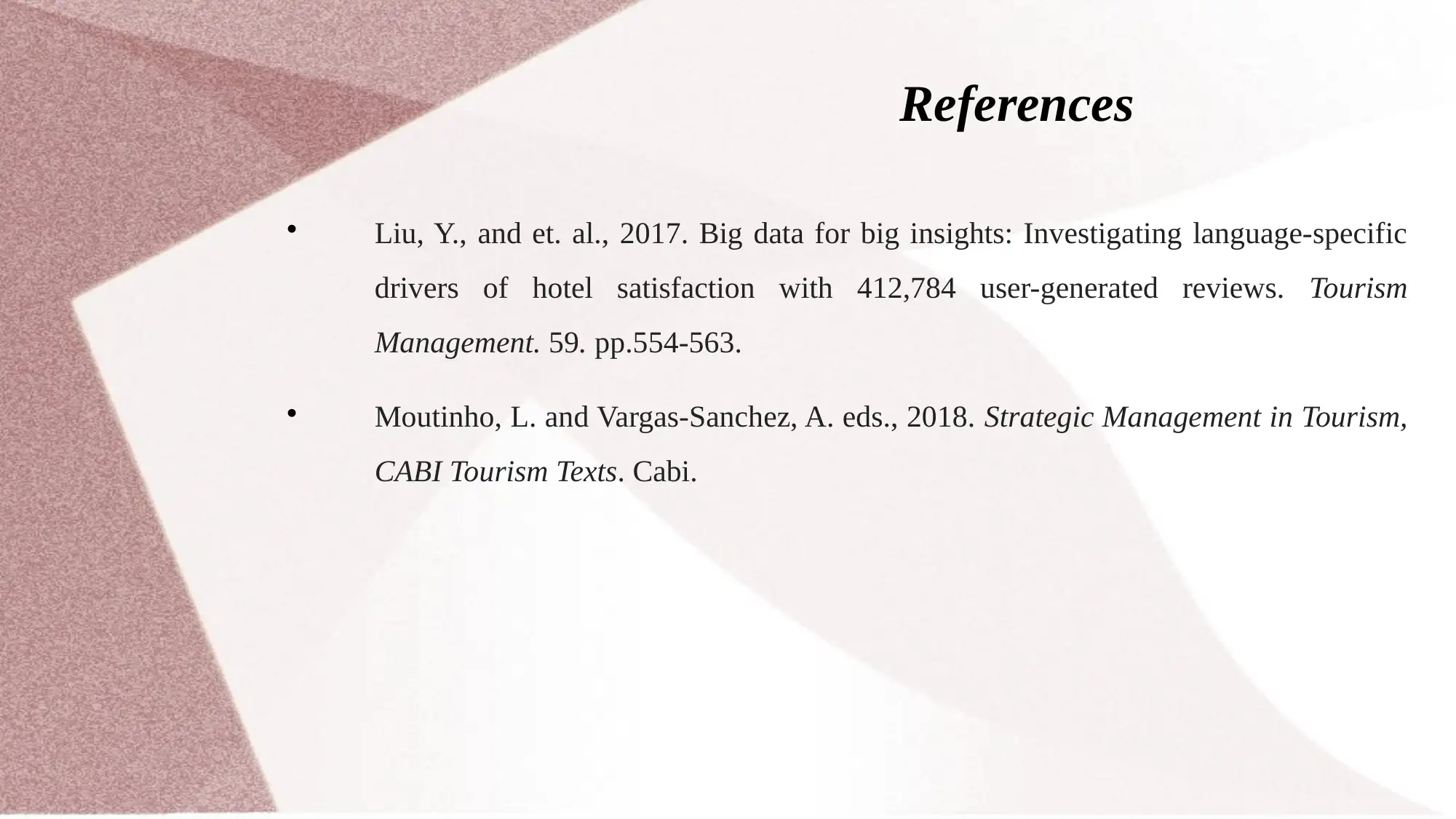
References
Liu, Y., and et. al., 2017. Big data for big insights: Investigating language-specific
drivers of hotel satisfaction with 412,784 user-generated reviews. Tourism
Management. 59. pp.554-563.
Moutinho, L. and Vargas-Sanchez, A. eds., 2018. Strategic Management in Tourism,
CABI Tourism Texts. Cabi.
Liu, Y., and et. al., 2017. Big data for big insights: Investigating language-specific
drivers of hotel satisfaction with 412,784 user-generated reviews. Tourism
Management. 59. pp.554-563.
Moutinho, L. and Vargas-Sanchez, A. eds., 2018. Strategic Management in Tourism,
CABI Tourism Texts. Cabi.
⊘ This is a preview!⊘
Do you want full access?
Subscribe today to unlock all pages.

Trusted by 1+ million students worldwide
1 out of 13
Related Documents
Your All-in-One AI-Powered Toolkit for Academic Success.
+13062052269
info@desklib.com
Available 24*7 on WhatsApp / Email
![[object Object]](/_next/static/media/star-bottom.7253800d.svg)
Unlock your academic potential
Copyright © 2020–2026 A2Z Services. All Rights Reserved. Developed and managed by ZUCOL.





